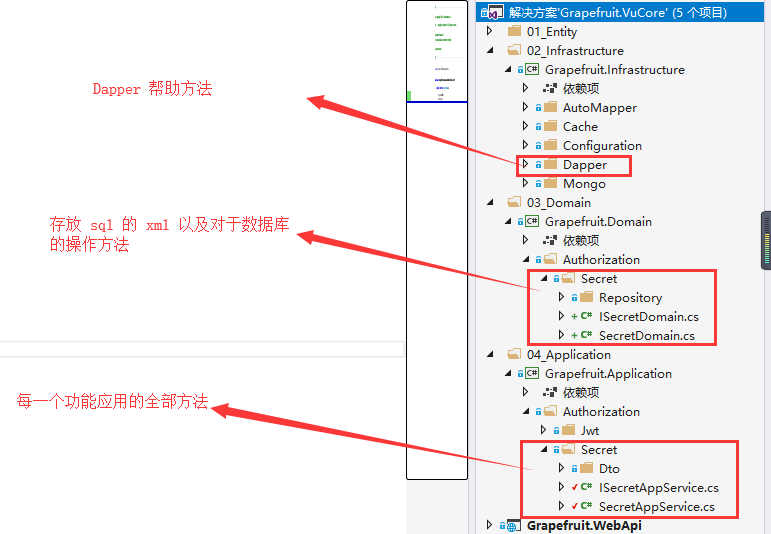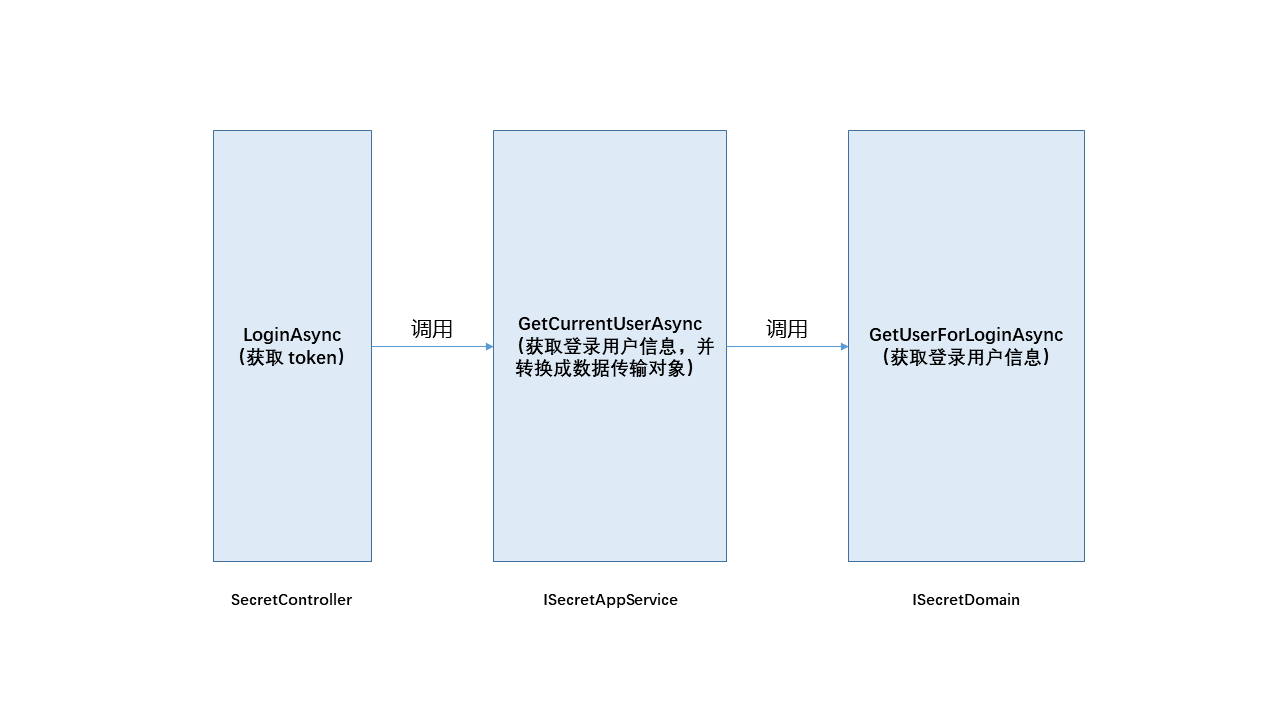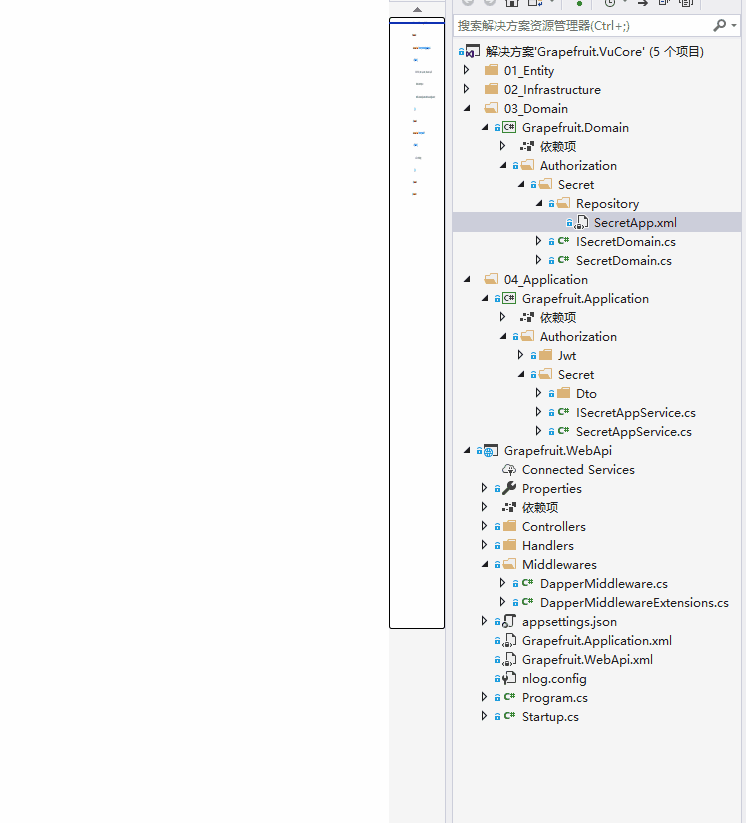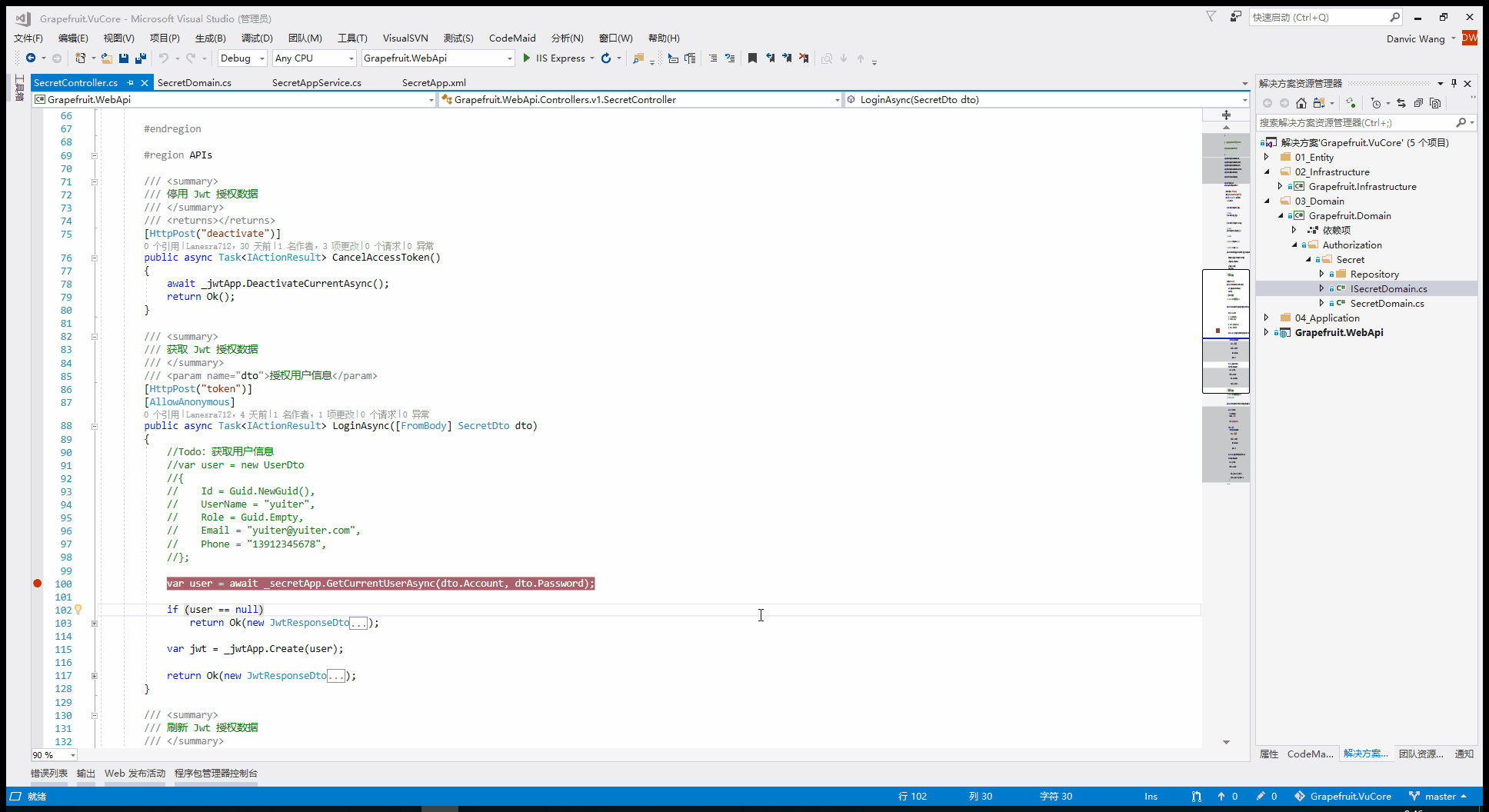一、前言
在非静态页面的项目开发中,必定会涉及到对于数据库的访问,最开始呢,我们使用 Ado.Net,通过编写 SQL 帮助类帮我们实现对于数据库的快速访问,后来,ORM(Object Relational Mapping,对象关系映射)出现了,我们开始使用 EF、Dapper、NHibernate,亦或是国人的 SqlSugar 代替我们原来的 SqlHelper.cs。通过这些 ORM 工具,我们可以很快速的将数据库中的表与代码中的类进行映射,同时,通过编写 SQL 或是 Lambda 表达式的方式,更加便捷的实现对于数据层的访问。
就像文章标题中所说的这样,在这个项目中我是使用的 Dapper 来进行的数据访问,每个人都有自己的编程习惯,本篇文章只是介绍我在 Grapefruit.VuCore 这个项目中是如何基于 Dapper 创建自己使用的帮助方法的,不会涉及各种 ORM 工具的对比,请友善查看、讨论。
系列目录地址:ASP.NET Core 项目实战
仓储地址:https://github.com/Lanesra712/Grapefruit.VuCore
二、Step by Step
1、整体思路
在 Grapefruit.VuCore 这个项目中,我选择将 SQL 语句存储在 XML 文件中(XML 以嵌入的资源的方式嵌入到程序集中),通过编写中间件的方式,在程序运行时将存储有 SQL 语句的 XML 程序集写入到 Redis 缓存中。当使用到 SQL 语句时,通过 Redis 中的 Key 值进行获取到 Value,从而将 SQL 语句与我们的代码进行拆分。
涉及到的类文件主要是在以下的类库中,基于 Dapper 的数据访问代码则位于基础构造层(02_Infrastructure)中,而使用到这些数据访问代码的,有且仅在位于领域层(03_Domain)中的代码。同时,领域层的文件分布结构和应用层(04_Applicatin)保持相同。

2、扩展数据访问方法
在使用 Dapper 之前,我们首先需要在 Grapefruit.Infrastructure 这个类库中添加对于 Dapper 的引用。同时,因为需要将 SQL 语句存储到 Redis 缓存中,与之前使用 Redis 存储 Token 时相同,这里,也是使用的微软的分布式缓存接口,因此,同样需要添加对于此 DLL 的引用。
Install-Package Dapper
Install-Package Microsoft.Extensions.Caching.Abstractions
在 Grapefruit.Infrastructure 类库中创建一个 Dapper 文件夹,我们基于 Dapper 的扩展代码全部置于此处,整个的代码结构如下图所示。

在整个 Dapper 文件夹下类/接口/枚举文件,主要可以按照功能分为三部分。
2.1、辅助功能文件
主要包含 DataBaseTypeEnum 这个枚举类以及 SqlCommand 这个用来将存储在 XML 中的 SQL 进行映射的帮助类。
DataBaseTypeEnum 这个数据库类型枚举类主要定义了可以使用的数据库类型。我们知道,Dapper 这个 ORM 主要是通过扩展 IDbConnection 接口,从而给我们提供附加的数据操作功能,而我们在创建数据库连接对象时,不管是 SqlConnection 还是 MySqlConnection 最终对于数据库最基础的操作,都是继承于 IDbConnection 这个接口。因此,我们可以在后面创建数据库连接对象时,通过不同的枚举值,创建针对不同数据库操作的数据库连接对象。
public enum DataBaseTypeEnum { SqlServer = 1, MySql = 2, PostgreSql = 3, Oracle = 4 }
SqlCommand 这个类文件只是定义了一些属性,因为我是将 SQL 语句写到 XML 文件中,同时会将 XML 文件存储到 Redis 缓存中,因此,SqlCommand 这个类主要用来将我们获取到的 SQL 语句与类文件做一个映射关系。
public class SqlCommand { /// <summary> /// SQL语句名称 /// </summary> public string Name { get; set; } /// <summary> /// SQL语句或存储过程内容 /// </summary> public string Sql { get; set; } }
2.2、SQL 存储读取
对于 SQL 语句的存储、读取,我定义了一个 IDataRepository 接口,DataRepository 继承于 IDataRepository 实现对于 SQL 语句的操作。
public interface IDataRepository { /// <summary> /// 获取 SQL 语句 /// </summary> /// <param name="commandName"></param> /// <returns></returns> string GetCommandSQL(string commandName); /// <summary> /// 批量写入 SQL 语句 /// </summary> void LoadDataXmlStore(); }
存储 SQL 的 XML 我是以附加的资源存储到 dll 中,因此,这里我是通过加载 dll 的方式获取到所有的 SQL 语句,之后,根据 Name 属性判断 Redis 中是否存在,当不存在时就写入 Redis 缓存中。核心的代码如下所示,如果你需要查看完整的代码,可以去 Github 上查看。
/// <summary> /// 载入dll中包含的SQL语句 /// </summary> /// <param name="fullPath">命令名称</param> private void LoadCommandXml(string fullPath) { SqlCommand command = null; Assembly dll = Assembly.LoadFile(fullPath); string[] xmlFiles = dll.GetManifestResourceNames(); for (int i = 0; i < xmlFiles.Length; i++) { Stream stream = dll.GetManifestResourceStream(xmlFiles[i]); XElement rootNode = XElement.Load(stream); var targetNodes = from n in rootNode.Descendants("Command") select n; foreach (var item in targetNodes) { command = new SqlCommand { Name = item.Attribute("Name").Value.ToString(), Sql = item.Value.ToString().Replace("<![CDATA[", "").Replace("]]>", "") }; command.Sql = command.Sql.Replace(" ", "").Replace(" ", "").Trim(); LoadSQL(command.Name, command.Sql); } } } /// <summary> /// 载入SQL语句 /// </summary> /// <param name="commandName">SQL语句名称</param> /// <param name="commandSQL">SQL语句内容</param> private void LoadSQL(string commandName, string commandSQL) { if (string.IsNullOrEmpty(commandName)) { throw new ArgumentNullException("CommandName is null or empty!"); } string result = GetCommandSQL(commandName); if (string.IsNullOrEmpty(result)) { StoreToCache(commandName, commandSQL); } }
2.3、数据操作
对于数据的操作,这里我定义了 IDataAccess 这个接口,提供了同步、异步的方式,实现对于数据的访问。在项目开发中,对于数据的操作,更多的还是根据字段值获取对象、获取对象集合、执行 SQL 获取受影响的行数,获取字段值,所以,这里主要就定义了这几类的方法。
public interface IDataAccess { /// 关闭数据库连接 bool CloseConnection(IDbConnection connection); /// 数据库连接 IDbConnection DbConnection(); /// 执行SQL语句或存储过程返回对象 T Execute<T>(string sql, object param, bool hasTransaction = false, CommandType commandType = CommandType.Text); /// 执行SQL语句返回对象 T Execute<T>(string sql, object param, IDbTransaction transaction, IDbConnection connection, CommandType commandType = CommandType.Text); /// 执行SQL语句或存储过程返回对象 Task<T> ExecuteAsync<T>(string sql, object param, bool hasTransaction = false, CommandType commandType = CommandType.Text); /// 执行SQL语句返回对象 Task<T> ExecuteAsync<T>(string sql, object param, IDbTransaction transaction, IDbConnection connection, CommandType commandType = CommandType.Text); /// 执行SQL语句或存储过程,返回IList<T>对象 IList<T> ExecuteIList<T>(string sql, object param, bool hasTransaction = false, CommandType commandType = CommandType.Text); /// 执行SQL语句或存储过程,返回IList<T>对象 IList<T> ExecuteIList<T>(string sql, object param, IDbTransaction transaction, IDbConnection connection, CommandType commandType = CommandType.Text); /// 执行SQL语句或存储过程,返回IList<T>对象 Task<IList<T>> ExecuteIListAsync<T>(string sql, object param, bool hasTransaction = false, CommandType commandType = CommandType.Text); /// 执行SQL语句或存储过程,返回IList<T>对象 Task<IList<T>> ExecuteIListAsync<T>(string sql, object param, IDbTransaction transaction, IDbConnection connection, CommandType commandType = CommandType.Text); /// 执行SQL语句或存储过程返回受影响行数 int ExecuteNonQuery(string sql, object param, bool hasTransaction = false, CommandType commandType = CommandType.Text); /// 执行SQL语句或存储过程返回受影响行数 int ExecuteNonQuery(string sql, object param, IDbTransaction transaction, IDbConnection connection, CommandType commandType = CommandType.Text); /// 执行SQL语句或存储过程返回受影响行数 Task<int> ExecuteNonQueryAsync(string sql, object param, bool hasTransaction = false, CommandType commandType = CommandType.Text); /// 执行SQL语句或存储过程返回受影响行数 Task<int> ExecuteNonQueryAsync(string sql, object param, IDbTransaction transaction, IDbConnection connection, CommandType commandType = CommandType.Text); /// 执行语句返回T对象 T ExecuteScalar<T>(string sql, object param, bool hasTransaction = false, CommandType commandType = CommandType.Text); /// 执行语句返回T对象 Task<T> ExecuteScalarAsync<T>(string sql, object param, bool hasTransaction = false, CommandType commandType = CommandType.Text); }
在 IDataAccess 接口的功能实现与调用上,我采用了代理模式的方式,会涉及到 DataAccess、DataAccessProxy、DataAccessProxyFactory、DBManager 这四个类文件,之间的调用过程如下。
DataAccess 是接口的实现类,通过下面的几个类进行隐藏,不直接暴露给外界方法。一些接口的实现如下所示。
/// <summary> /// 创建数据库连接 /// </summary> /// <returns></returns> public IDbConnection DbConnection() { IDbConnection connection = null; switch (_dataBaseType) { case DataBaseTypeEnum.SqlServer: connection = new SqlConnection(_connectionString); break; case DataBaseTypeEnum.MySql: connection = new MySqlConnection(_connectionString); break; }; return connection; } /// <summary> /// 执行SQL语句或存储过程,返回IList<T>对象 /// </summary> /// <typeparam name="T">类型</typeparam> /// <param name="sql">SQL语句 or 存储过程名</param> /// <param name="param">参数</param> /// <param name="transaction">外部事务</param> /// <param name="connection">数据库连接</param> /// <param name="commandType">命令类型</param> /// <returns></returns> public IList<T> ExecuteIList<T>(string sql, object param, IDbTransaction transaction, IDbConnection connection, CommandType commandType = CommandType.Text) { IList<T> list = null; if (connection.State == ConnectionState.Closed) { connection.Open(); } try { if (commandType == CommandType.Text) { list = connection.Query<T>(sql, param, transaction, true, null, CommandType.Text).ToList(); } else { list = connection.Query<T>(sql, param, transaction, true, null, CommandType.StoredProcedure).ToList(); } } catch (Exception ex) { _logger.LogError($"SQL语句:{sql},使用外部事务执行 ExecuteIList<T> 方法出错,错误信息:{ex.Message}"); throw ex; } return list; }
DBManager 是外界方法访问的类,通过 CreateDataAccess 方法会创建一个 IDataAccess 对象,从而达到访问接口中方法的目的。
[ThreadStatic] private static IDataAccess _sMsSqlFactory; /// <summary> /// /// </summary> /// <param name="cp"></param> /// <returns></returns> private static IDataAccess CreateDataAccess(ConnectionParameter cp) { return new DataAccessProxy(DataAccessProxyFactory.Create(cp)); } /// <summary> /// MsSQL 数据库连接字符串 /// </summary> public static IDataAccess MsSQL { get { ConnectionParameter cp; if (_sMsSqlFactory == null) { cp = new ConnectionParameter { ConnectionString = ConfigurationManager.GetConfig("ConnectionStrings:MsSQLConnection"), DataBaseType = DataBaseTypeEnum.SqlServer }; _sMsSqlFactory = CreateDataAccess(cp); } return _sMsSqlFactory; } }
DataAccessProxy 就是实际接口功能实现类的代理,通过有参构造函数的方式进行调用,同时,类中继承于 IDataAccess 的方法都是不实现的,都是通过 _dataAccess 调用接口中的方法。
/// <summary> /// /// </summary> private readonly IDataAccess _dataAccess; /// <summary> /// ctor /// </summary> /// <param name="dataAccess"></param> public DataAccessProxy(IDataAccess dataAccess) { _dataAccess = dataAccess ?? throw new ArgumentNullException("dataAccess is null"); } /// <summary> /// 执行SQL语句或存储过程,返回IList<T>对象 /// </summary> /// <typeparam name="T">类型</typeparam> /// <param name="sql">SQL语句 or 存储过程名</param> /// <param name="param">参数</param> /// <param name="transaction">外部事务</param> /// <param name="connection">数据库连接</param> /// <param name="commandType">命令类型</param> /// <returns></returns> public IList<T> ExecuteIList<T>(string sql, object param, IDbTransaction transaction, IDbConnection connection, CommandType commandType = CommandType.Text) { return _dataAccess.ExecuteIList<T>(sql, param, transaction, connection, commandType); }
DataAccessProxyFactory 这个类有一个 Create 静态方法,通过实例化 DataAccess 类的方式返回 IDataAccess 接口,从而达到真正调用到接口实现类。
/// <summary> /// 创建数据库连接字符串 /// </summary> /// <param name="cp"></param> /// <returns></returns> public static IDataAccess Create(ConnectionParameter cp) { if (string.IsNullOrEmpty(cp.ConnectionString)) { throw new ArgumentNullException("ConnectionString is null or empty!"); } return new DataAccess(cp.ConnectionString, cp.DataBaseType); }
3、使用方法
因为我们对于 SQL 语句的获取全部是从缓存中获取的,因此,我们需要在程序执行前将所有的 SQL 语句写入 Redis 中。在 ASP.NET MVC 中,我们可以在 Application_Start 方法中进行调用,但是在 ASP.NET Core 中,我一直没找到如何实现仅在程序开始运行时执行代码,所以,这里,我采用了中间件的形式将 SQL 语句存储到 Redis 中,当然,你的每一次请求,都会调用到这个中间件。如果大家有好的方法,欢迎在评论区里指出。
public class DapperMiddleware { private readonly ILogger _logger; private readonly IDataRepository _repository; private readonly RequestDelegate _request; /// <summary> /// ctor /// </summary> /// <param name="repository"></param> /// <param name="logger"></param> /// <param name="request"></param> public DapperMiddleware(IDataRepository repository, ILogger<DapperMiddleware> logger, RequestDelegate request) { _repository = repository; _logger = logger; _request = request; } /// <summary> /// 注入中间件到HttpContext中 /// </summary> /// <param name="context"></param> /// <returns></returns> public async Task InvokeAsync(HttpContext context) { Stopwatch sw = new Stopwatch(); sw.Start(); //加载存储xml的dll _repository.LoadDataXmlStore(); sw.Stop(); TimeSpan ts = sw.Elapsed; _logger.LogInformation($"加载存储 XML 文件DLL,总共用时:{ts.TotalMinutes} 秒"); await _request(context); } }
中间件的实现,只是调用了之前定义的 IDataRepository 接口中的 LoadDataXmlStore 方法,同时记录下了加载的时间。在 DapperMiddlewareExtensions 这个静态类中,定义了中间件的使用方法,之后我们在 Startup 的 Configure 方法里调用即可。
public static class DapperMiddlewareExtensions { /// <summary> /// 调用中间件 /// </summary> /// <param name="builder"></param> /// <returns></returns> public static IApplicationBuilder UseDapper(this IApplicationBuilder builder) { return builder.UseMiddleware<DapperMiddleware>(); } }
中间件的调用代码如下,同时,因为我们在中间件中通过依赖注入的方式使用到了 IDataRepository 接口,所以,我们也需要在 ConfigureServices 中注入该接口,这里,采用单例的方式即可。
public class Startup { // This method gets called by the runtime. Use this method to add services to the container. public void ConfigureServices(IServiceCollection services) { //DI Sql Data services.AddTransient<IDataRepository, DataRepository>(); } // This method gets called by the runtime. Use this method to configure the HTTP request pipeline. public void Configure(IApplicationBuilder app, IHostingEnvironment env, IApiVersionDescriptionProvider provider) { //Load Sql Data app.UseDapper(); } }
当所有的 SQL 语句写入到缓存中后,我们就可以使用了,这里的示例代码实现的是上一篇(ASP.NET Core 实战:基于 Jwt Token 的权限控制全揭露)中,进行 Jwt Token 授权,验证登录用户信息的功能。

整个的调用过程如下图所示。

在 SecretDomain 中,我定义了一个 GetUserForLoginAsync 方法,通过帐户名和密码获取用户的信息,调用了之前定义的数据访问方法。
public class SecretDomain : ISecretDomain { #region Initialize /// <summary> /// 仓储接口 /// </summary> private readonly IDataRepository _repository; /// <summary> /// ctor /// </summary> /// <param name="repository"></param> public SecretDomain(IDataRepository repository) { _repository = repository; } #endregion #region API Implements /// <summary> /// 根据帐户名、密码获取用户实体信息 /// </summary> /// <param name="account">账户名</param> /// <param name="password">密码</param> /// <returns></returns> public async Task<IdentityUser> GetUserForLoginAsync(string account, string password) { StringBuilder strSql = new StringBuilder(); strSql.Append(_repository.GetCommandSQL("Secret_GetUserByLoginAsync")); string sql = strSql.ToString(); return await DBManager.MsSQL.ExecuteAsync<IdentityUser>(sql, new { account, password }); } #endregion }
XML 的结构如下所示,注意,这里需要修改 XML 的属性,生成操作改为附加的资源。
<?xml version="1.0" encoding="utf-8" ?> <Commands> <Command Name="Secret_GetUserByLoginAsync"> <![CDATA[ SELECT Id ,Name ,Account ,Password ,Salt FROM IdentityUser WHERE Account=@account AND Password=@password; ]]> </Command> <Command Name="Secret_NewId"> <![CDATA[ select NEWID(); ]]> </Command> </Commands>

因为篇幅原因,这里就不把所有的代码都列出来,整个调用的过程演示如下,如果有不明白的,或是有什么好的建议的,欢迎在评论区中提出。因为,数据库表并没有设计好,这里只是建了一个实验用的表,,这里我使用的是 SQL Server 2012,创建表的 SQL 语句如下。
USE [GrapefruitVuCore] GO ALTER TABLE [dbo].[IdentityUser] DROP CONSTRAINT [DF_User_Id] GO /****** Object: Table [dbo].[IdentityUser] Script Date: 2019/2/24 9:41:15 ******/ DROP TABLE [dbo].[IdentityUser] GO /****** Object: Table [dbo].[IdentityUser] Script Date: 2019/2/24 9:41:15 ******/ SET ANSI_NULLS ON GO SET QUOTED_IDENTIFIER ON GO CREATE TABLE [dbo].[IdentityUser]( [Id] [uniqueidentifier] NOT NULL, [Name] [nvarchar](50) NOT NULL, [Account] [nvarchar](50) NOT NULL, [Password] [nvarchar](100) NOT NULL, [Salt] [uniqueidentifier] NOT NULL, CONSTRAINT [PK__User__3214EC07D257C709] PRIMARY KEY CLUSTERED ( [Id] ASC )WITH (PAD_INDEX = OFF, STATISTICS_NORECOMPUTE = OFF, IGNORE_DUP_KEY = OFF, ALLOW_ROW_LOCKS = ON, ALLOW_PAGE_LOCKS = ON) ON [PRIMARY] ) ON [PRIMARY] GO ALTER TABLE [dbo].[IdentityUser] ADD CONSTRAINT [DF_User_Id] DEFAULT (newid()) FOR [Id] GO

三、总结
这一章主要是介绍下我是如何使用 Dapper 构建我的数据访问帮助方法的,每个人都会有自己的编程习惯,这里只是给大家提供一个思路,适不适合你就不一定啦。因为年后工作开始变得多起来了,现在主要都是周末才能写博客了,所以更新的速度会变慢些,同时,这一系列的文章,按我的设想,其实还有一两篇文章差不多就结束了(VUE 前后端交互、Docker 部署),嗯,因为 Vue 那块我还在学习中(其实就是很长时间没看了。。。),所以接下来的一段时间可能会侧重于 Vue 系列(Vue.js 牛刀小试),ASP.NET Core 系列可能会不定期更新,希望大家同样可以多多关注啊。最后,感谢之前赞赏的小伙伴。